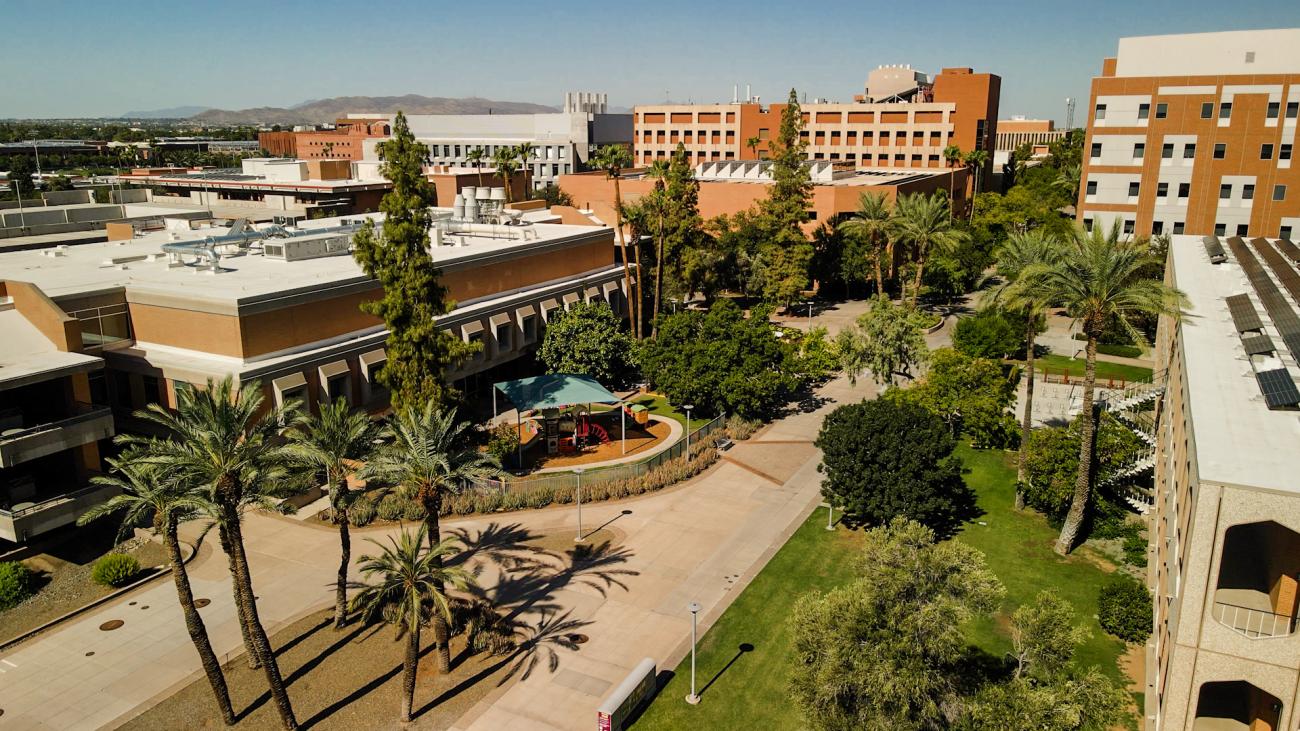
SPLAT Lab (Shiota)

The Shiota Psychophysiology Laboratory for Affective Testing (SPLAT Lab) conducts research on the basic nature and translational implications of human emotion, with particular emphasis on positive emotions, emotional processes in close relationships, and emotional mechanisms of health behavior and behavior change. Studies use a variety of designs (e.g., experimental, longitudinal/daily diary, cross-sectional) as well as behavioral, cognitive, physiological, narrative, and questionnaire measures. Core themes include:
Positive Emotions. Researchers have long differentiated several negative emotions, such as sadness, fear, and anger, but empirical research on potentially "discrete" positive emotions is more recent. Our lab takes an evolutionary approach to defining multiple positive emotions, and studies the extent of overlap and differentiation among these states. We use the proposed adaptive functions of each emotion as a basis for predicting various aspects of emotional responding, including aspects of subjective experience, profiles of autonomic nervous system reactivity, nonverbal expression, and implications for social cognition and behavior. Current projects focus in particular on awe, amusement/humor, and varieties of love.
Emotional Processes in Close Relationships. Although emotions feel like intensely personal experiences, they are also profoundly important for our interactions with other people. We form impressions of new people, build and maintain close relationships, and coordinate dyadic and group action all with the help of emotions. Our research investigates some of the mechanisms by which emotions support relationships, and how the quality of close relationships impacts emotional experience. Current projects address perceived social support and a sense of belonging, the development of attachment bonds, and the ways in which relationship partners regulate each other’s emotions during stressful times.
Emotional Mechanisms of Behavior Change. Several of the great societal problems of our time involve behavior. Behaviors such as smoking, disordered alcohol and drug use, poor diet, and lack of exercise are major causes of preventable disease. Unsustainable consumption of energy and resources is creating a global environmental crisis. New media and internet-based technologies are drastically re-shaping human social interaction, economic decision-making, and participation in public life, with unpredictable and sometimes problematic consequences. Emotion is woven into the fabric of human behavior across these domains. Eating a candy bar, drinking to excess, buying a lottery ticket or a more expensive car than you can afford, and checking social media incessantly for “likes” of your last post are all mediated by neural mechanisms supporting our emotional responses to rewards. Emotional stress and exhaustion increase the difficulty of regulating our behavior, whether it’s resisting the temptation to smoke, taking the time to fact-check a political ad, or remembering to bring reusable bags to the store. In a growing area of focus, we’re investigating ways in which basic knowledge about emotions and emotion regulation can be applied to guide new techniques for promoting healthy and sustainable behavior. Current projects include development and evaluation of trainings to administer naloxone (a drug to reverse opioid overdose), as well as assessment of and intervention to reduce stigma/prejudice associated with substance use disorder.
The application period for Fall 2024 admission to the ASU Doctoral Program in Social Psychology is closed. Dr. Shiota will consider applications from potential graduate students to join the lab in Fall 2025.
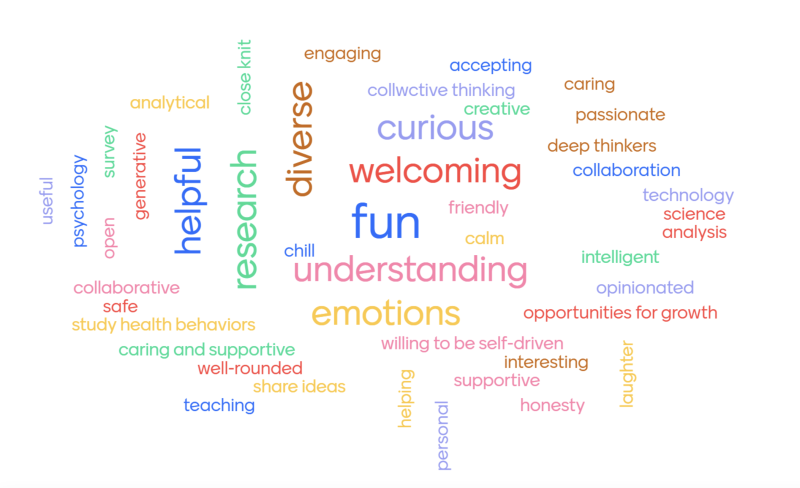
Lab Director and Principal Investigator: Michelle "Lani" Shiota, PhD, Associate Professor
Image
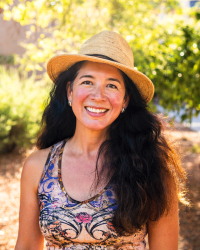
| Dr. Michelle "Lani" Shiota is a Professor of Psychology at ASU (Social Psychology doctoral program). Her basic science investigates positive emotions, emotion regulation, emotion in close relationships, and emotional mechanisms of health behavior and behavior change. She also has a growing body of applied research related to addiction, including development and evaluation of trainings for community members in opioid overdose reversal as well as intervention to reduce substance use disorder stigma. She received her B.A. in Communication from Stanford University, and her Ph.D. in Social/Personality Psychology from UC Berkeley. Her lab’s work is published in high-impact journals including American Psychologist, JPSP, PSPB, Emotion, Evolution and Human Behavior, and Prevention Science. Dr. Shiota is author of the textbook Emotion & Motivation (Oxford University Press; co-author Sarah Rose Cavanagh), as well as the Handbook of Positive Emotions (Guilford; co-authors Michele Tugade and Leslie Kirby). She is currently co-Editor in Chief of the journal Affective Science, in partnership with Ralph Adolphs and Linda Camras. In addition to her professional calling in Psychology, Lani has an active life as a jazz, contemporary, and hip-hop dancer. She joined the ASU faculty in 2006. Contact: [email protected]. |
Graduate Students
Image

| Carley Vornlocher, Doctoral Student, Social Psychology Carley is a 6th-year student in the Social Psychology Ph.D. program at ASU. Carley's research employs experimental, intervention, and intensive-longitudinal designs to examine the roles emotional and relational processes play in health, well-being, and behavior change. Through the lens of attachment theory, Carley's research examines the affective and cognitive mechanisms by which close relationships can bolster health, well-being, and goal pursuit. Other projects investigate how certain emotions and emotion regulation strategies influence well-being and/or may be leveraged to help initiate and sustain engagement in positive health behaviors. Contact: [email protected]. |
Image
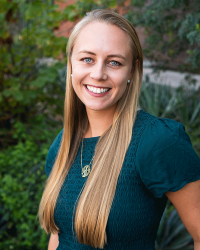
| Jamie Katz, Doctoral Student, Social Psychology Jamie Katz is a 4th-year student in the Social Psychology Ph.D. program at ASU, and the current SPLAT Lab Manager. Her research investigates the effects of awe, a distinct positive emotion, on memory, cognition, and behavior. Current projects investigate how awe, along with other discrete emotion states, affect memory for visual stimuli and physiological responses. She is also interested more generally in how positive emotions relate to well-being. Contact: [email protected]. |
Image

| Reet Kaur, Doctoral Student, Social Psychology Reet is an incoming PhD student in the Social Psychology Ph.D. program at ASU. Her research will focus on the interpersonal foundations of emotional development, with a particular interest in how recurring relationship patterns shape identity, emotion regulation, and well-being. She is interested in exploring how emotionally charged interactions, ranging from support to subtle social harm, influence the trajectory of our relationships and emotional well-being. Reet completed her BA Honors in Psychology at the University of British Columbia. Contact: [email protected]. |
Image

| Triston Hanna, Doctoral Candidate, Philosophy Triston is a 7th year student in the Philosophy PhD program in the School of Historical, Religious, and Philosophical Studies at ASU. His primary research interests are in moral psychology and moral philosophy. In particular, Triston looks at the social evaluation of emotional experiences hoping to shed light on the norms that govern those evaluations, and on their weight within our socio-moral lives. Utilizing insights from sociology, affective science, empirical moral psychology, feminist philosophy, and normative ethics, he argues against the presumption that the sole or primary function of emotions is to correspond with reality. Emotions serve various roles in our lives, are responsive to multiple kinds of reasons, and can be good in multiple ways; or so he hopes to show. His other projects include work on trans dehumanization, on our socio-moral practice of sharing information about the moral characters of others, and on the role of emotions in meaningful human lives. He is also generally interested in emotion theory, and in the roles that emotions play in thwarting and accelerating moral progress. Contact: [email protected]. |
SPLAT Lab Graduate Student Alumni
- Erika Langley (2024) Assistant Professor, Whitman College
- Adi Wiezel (2023) Assistant Professor, Elon University
- Diego Guevara Beltran (2023) President’s Postdoctoral Fellow, University of Arizona
- Makenzie O'Neil (2019) Assistant Professor, Saint Mary's College of California
- Ryan Hampton (2019) T32 Postdoctoral Research Associate, Department of Psychology, University of Wisconsin-Madison
- Claire Yee (2018), Biostatistician, Mayo Clinic Scottsdale
- Alexander Danvers (2017), Director of Treatment Outcomes, Sierra Tucson
- Elizabeth Osborne (2014), User Experience Researcher, Microsoft
- Samantha Neufeld (2012), Senior Design Researcher, Microsoft
Join the SPLAT Lab!
Dr. Shiota will consider graduate student applications for Fall 2025. Potential graduate students interested in working with Dr. Shiota as primary advisor should apply to the ASU Social Psychology program within the Department of Psychology (Tempe Campus). Co-mentorship arrangements with other faculty, within and beyond the Social Psychology program, are encouraged. Students wishing to matriculate into the Clinical Psychology program are welcome in the lab, but should seek a primary advisor among the Clinical area faculty.
Undergraduate Research Opportunities
We review applications from new volunteer Research Assistants each semester. Minimum requirements for joining the SPLAT lab team are:
- Minimum commitment of one academic year/two semesters
- For the first year, 399/499 enrollment at 10 hours/week
- In-person attendance at weekly lab meetings, Wednesdays 4:30-5:30pm
Research Assistants in the SPLAT lab contribute to every step of the scientific process, from discussion of theory to hypothesis generation, study design, data collection and processing, and interpretation of study findings. RAs have a wide range of duties, all of which provide training in the varied methods used in emotion research. Dr. Shiota and the graduate students in the lab rotate RAs through duties to ensure that each student gets broad exposure to the research process, and tailor the experience to each student’s interests and goals. Duties may include:
- In-person attendance at lab meetings Wednesdays 4:30-5:30pm (mandatory)
- Running laboratory-, Zoom-, and computer-based data collection sessions
- “Coding” or systematically recording behavior from A/V records or other data
- “Coding” or systematically recording the content of participants’ written responses to open-ended questions
- Attaching sensors to measure physiological variables, such as heart rate
- Processing study data (e.g., transcription, data entry)
SPLAT Lab RAs also receive extensive career development support through discussions in lab meetings as well as direct mentoring by Dr. Shiota and the SPLAT Lab graduate students. Those who have completed at least one year of RA work are eligible for mentoring in an honors thesis or comparable year-long independent research project.
To apply for a Research Assistant position please email Jamie Katz at [email protected].
The 4th edition of Emotion & Motivation, published by Oxford University Press, is now available! Previously titled Emotion, co-authored with the brilliant Jim Kalat, this new edition with co-author Sarah Rose Cavanagh merges the sciences of emotion, affect, and motivation. The text includes both classic and cutting-edge research, and encourages critical thinking by openly tackling ongoing controversies, contradictory findings, methodological limitations, and even replication failures in a balanced and constructive way. While highly rigorous, the text is also student-friendly, with a light, humorous tone. With real-world stories and an intuitive structure, Emotion and Motivation addresses questions undergraduates are most likely to ask: Why do we have emotions? How do they affect our lives? What motivates human behavior? How can we improve well-being? You can find the text at Amazon, as well as at the Oxford University Press website.
Select Publications (*SPLAT Lab graduate student/postdoc co-authors)
Below is a sample of recent journal articles and book chapters by Dr. Shiota and the SPLAT Lab. A complete list may be found in Dr. Shiota's curriculum vitae.
*O’Neil, M. J., *Danvers, A. F., Hu, J. I., & Shiota, M. N. (in press). Prototype facial response to cute stimuli: Expression and recognition. Manuscript accepted for publication in Personality and Social Psychology Bulletin.
*O’Neil, M. J., *Hampton, R. S., & Shiota, M. N. (in press). Be the change you want to see: Intergroup prosociality reduces ingroup bias and facilitates an outgroup bias in trading behaviors. Advance online, Personality and Social Psychology Bulletin.
*Langley, E. B., & Shiota, M. N. (in press). Funny Date, Creative Mate?: Unpacking the Effect of Humor on Romantic Attraction. Advance online, Personality and Social Psychology Bulletin.
*Vornlocher, C. & Shiota, M. N. (2024). Drinking while stressed and drinking to cope differentially relate to mental health. Behavioral Sciences, 14(5), 402.
*Guevara Beltran, D., Shiota, M. N., & Aktipis, A. (2024). Empathic concern motivates willingness to help in the absence of interdependence. Emotion, 24(3), 628-647.
*Langley, E. B., O’Leary, D., Gross, J. J., & Shiota, M. N. (2023). Breaking the link between negative emotion and unhealthy eating: The role of emotion regulation. Affective Science, 4(4), 702-710.
Shiota, M. N., *Vornlocher, C., & Jia, L. (2023). Emotional mechanisms of behavior change: Existing techniques, best practices, and a new approach. Policy Insights from the Behavioral and Brain Sciences, 10(2), 201-211.
*Langley, E. B., *Vornlocher, C., Manapat, P, & Shiota, M. N. (2023). Coping with COVID: Use, factor structure, and health behavior implications of emotion regulation strategies during the coronavirus pandemic. Social and Personality Psychology Compass, 17: e12812.
Shiota, M. N., Camras, L. A., & Adolphs, R. (2023). The future of affective science: Introduction to the special issue. Affective Science, 4(3), 429-442.
Doucerain, M., Senft, N., Campos, B., Shiota, M. N., & Chentsova-Dutton, Y. E. (2023). Within- and Between-Group Heterogeneity in Cultural Models of Emotion among People of European, Asian, and Latino Heritage in the U.S.. Emotion, 23(1), 1-14.
Shiota, M. N., Sauter, D. A., & Desmet, P. M. A. (2021). What are “positive” affect and emotion? Current Opinion in Behavioral Sciences, 39, 142-146.
*Danvers, A. F., *Scott, B., Shiota, M. N., Tein, J.-Y., Wolchik, S., & Sandler, I. (2020). Effects of Therapeutic Intervention on Parentally Bereaved Children’s Emotion Reactivity and Regulation 15 Years Later. Prevention Science, 21, 1017-1027.
*Danvers, A. F., & Shiota, M. N. (2018). Dynamically engaged smiling predicts cooperation above and beyond average smiling levels. Evolution and Human Behavior, 39(1), 112-119.
Shiota, M. N., Campos, B., Oveis, C., Hertenstein, M., Simon-Thomas, E., & Keltner, D. (2017). Beyond happiness: Toward a science of discrete positive emotions. American Psychologist, 72(7), 617-643.
June 2024. SPLAT grad student Carley Vornlocher has received an ASU Cialdini Speaker Series Research Award ($8,000) to test the effects of a brief gratitude intervention on health behavior outcomes. Congratulations Carley!
May 2024.
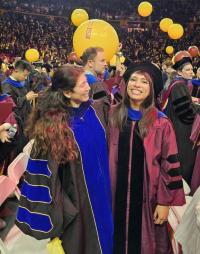
Huge congratulations to the newly-minted Dr. Erika Langley, who has just received her PhD! Her dissertation, titled Does it Reinforce or Ridicule? Predicting Inferences of Endorsement vs. Subversion in Stereotype Humor, presents new research on how people interpret jokes that invoke stereotypes about groups of people. The work is grounded in a sophisticated theoretical analysis that combines Erika’s expertise in humor, cognitive processing, and intergroup relations. Erika will begin a new position as Assistant Professor of Psychology at Whitman College this Fall. We are beyond proud of all Erika’s achievements, and wish her the very best in her new life!
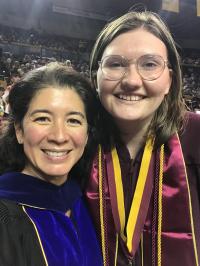
Congratulations to all of the SPLAT Lab Research Assistants who graduated this semester! We’re proud of you, we’ve been delighted to work with each of you, and we’re grateful for all your contributions to the lab’s work. Please stay in touch – we love to hear from you, and we’re here whenever you need us!
SPLAT Lab Graduating Class of 2024
- Crystallynn Bellew
- Khanh Bui
- Natalie Grossman
- Arden Hammond
- Riya Khanna
- Riley Lexvold
- Devina Morris
- Trinh Nguyen
- Alexander Stordeur
February 2024. SPLAT grads Carley Vornlocher and Jamie Katz have received a seed grant ($3,000) from the International Society for the Science of Existential Psychology to fund research asking whether experiencing awe “boosts” the effects of an intervention to improve relationship partner schemas, and whether these effects can be leveraged to improve well-being
January 2024. SPLAT grad student Jamie Katz has been elected co-President of the Psychology Graduate Student Association at ASU. Thank you for your service, Jami
December 2023. Carley Vornlocher has received ASU’s Sharon Manne Graduate Student Research Award ($16,600)! The study funded by this award will test the effects of a brief social support intervention for romantic couples on health behavior, well-being, and relationship outcomes. Congratulations Carley.
November 2023. Carley Vornlocher and Alexandra Wormley have received the ASU Institute for Social Science Research Poster Award! The poster presented their research examining the effects of positive and negative religious coping on physical and mental health, in four large, religiously and ethnically diverse samples.
September 2023. Dr. Shiota spoke at the 2023 meeting of the Clinton Global Initiative, highlighting the value of curiosity, wonder, and awe in approaching extremely complicated problems. The talk opened the meeting’s final event, followed by a panel with World Bank President Ajay Banga, Pfizer Chairman and CEO Albert Bourla, and Alphabet/Google President and CFO Ruth Porat, moderated by President Bill Clinton. Dr. Shiota’s talk can be viewed here.
June 2023. Jamie Katz is this year’s recipient of the Stephen D. Bisese Scholarship, awarded to graduates of the University of Richmond by Omicron Delta Kappa, the National Leadership Honor Society. This scholarship for graduate study is awarded in recognition of exceptional academic performance and leadership abilities. Congratulations, Jamie – well earned!!
June 2023. Congratulations to Carley Vornlocher and Alexandra Wormley, who have received funding ($22,500) from the Study on Stress, Spirituality, and Health Catalyst Fund to support data analyses examining the mechanistic role of religious coping strategy use in linking religiosity and spirituality to health outcomes.
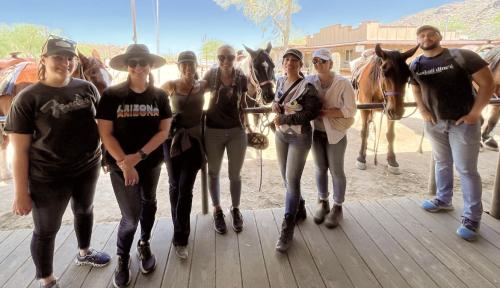
The SPLAT Lab continues to earn its reputation as “the FUN lab” yet again, with an end-of-year celebration including horseback riding and a picnic at The Farm at South Mountain! Pictured left to right are Amanda Kirsch, Adi Wiezel, Dr. Shiota, Jamie Katz, a horse, Erika Langley, Carley Vornlocher, another horse, and Diego Guevara Beltran. Congrats on a great year, all!
April 2023.
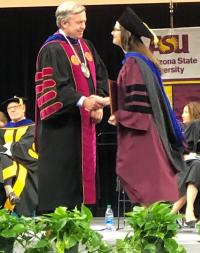
We’re delighted to present Dr. Adi Wiezel!! Adi receives her Ph.D. in Psychology, graduating from ASU’s doctoral program in Social Psychology. Her dissertation, “Using the Psychology of Immediate Rewards to Improve Intergroup Contact Across the Political Divide,” presents findings from a rigorous and extremely complex study aimed at reducing political polarization in the U.S.. Adi will join the faculty of Elon University in North Carolina as a tenure-line Assistant Professor this Fall. Congratulations Adi!